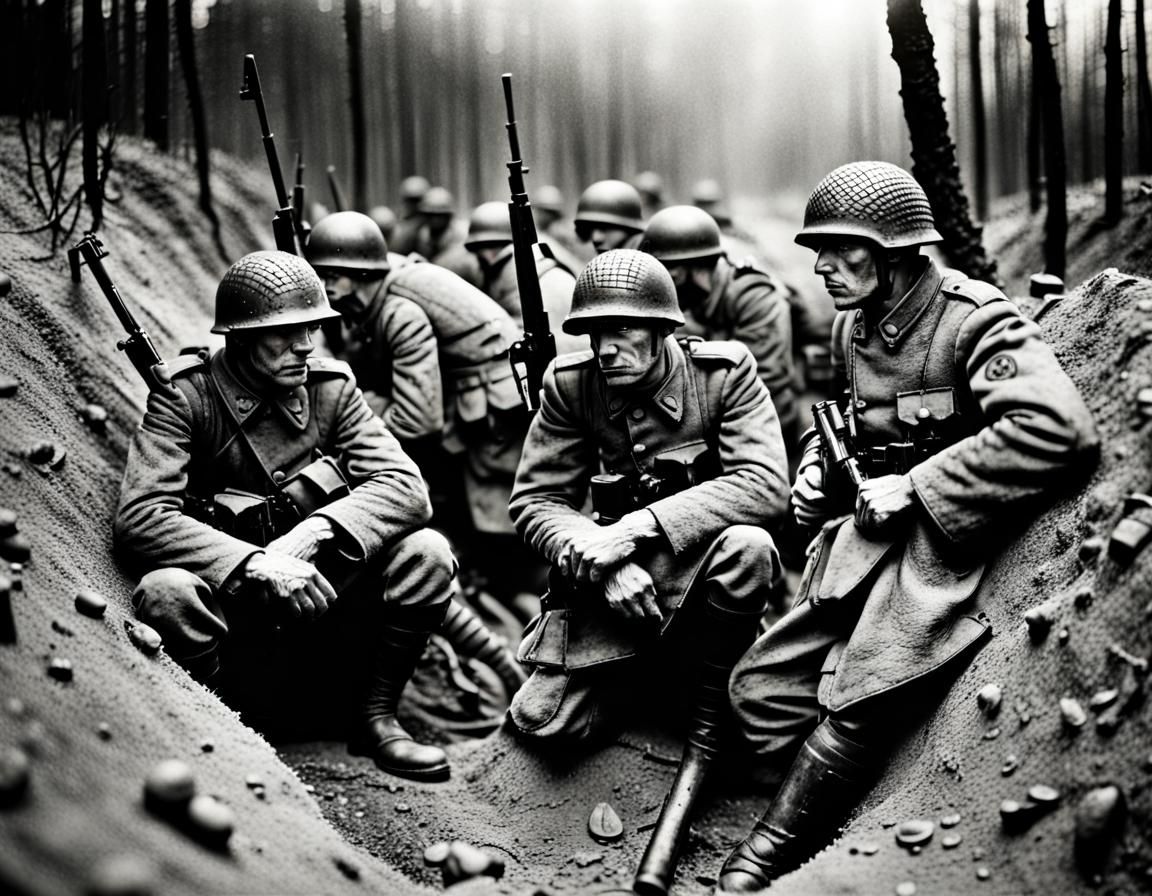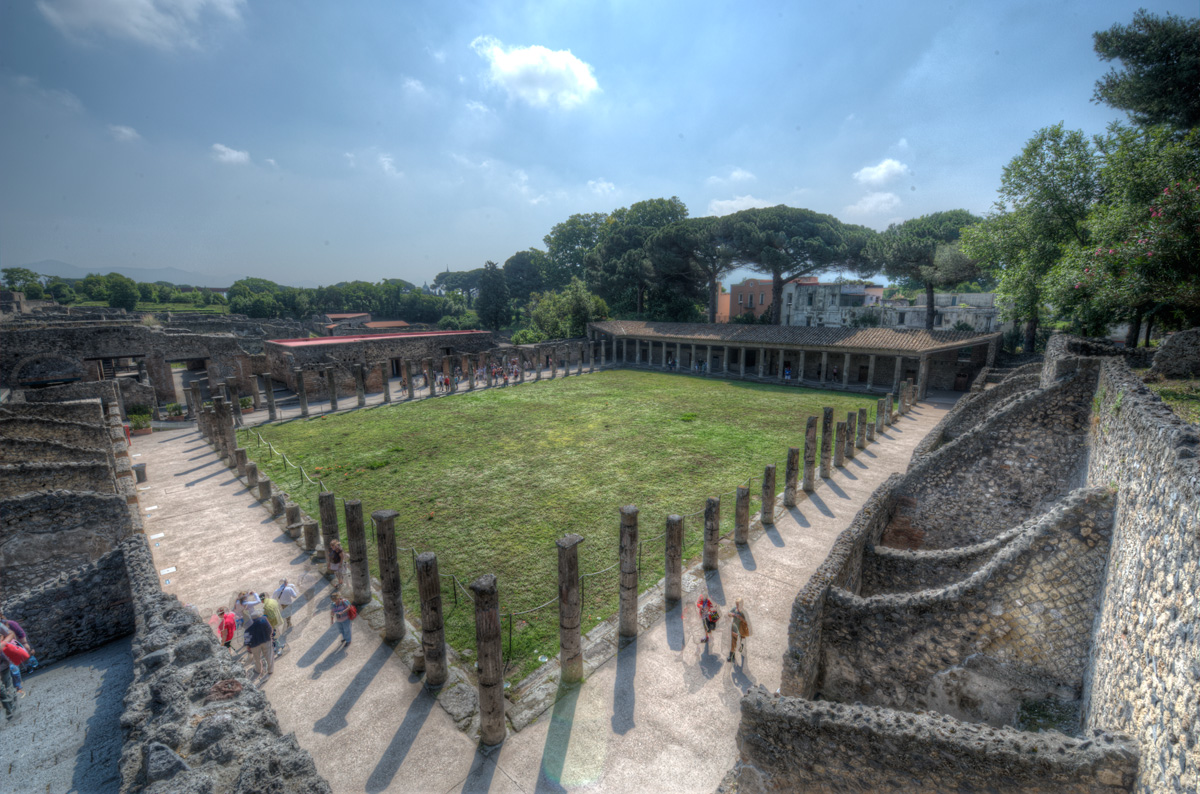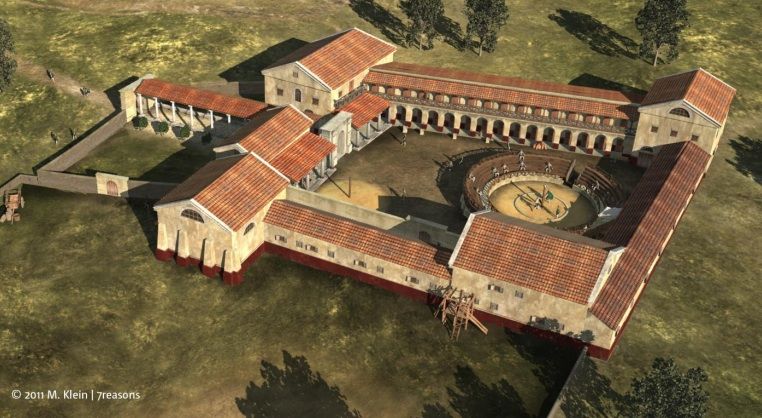-
Posts
6,248 -
Joined
-
Last visited
-
Days Won
146
Content Type
Profiles
Forums
Static Pages
News
Blogs
Gallery
Events
Downloads
Posts posted by caldrail
-
-
???? !!!!!!!!!!!
-
I would add that the Roman Empire was decentralised until the Dominate. Provinces were governed locally, by their own people though usually in emulation of Roman practice because that pleased the Senate and potentially earned them status, tax breaks, or commercial advantages.
Roman governors were not rulers, they were there to represent Rome and be the last word in Roman and native law. Having said that, most of them were there to get rich quick, though it did involve military responsibility too.
-
Roman paganism was not an organised religion, it was the same social function as the client/patron relationship only this time using temples and shrines instead of atriums, and unlike the wealthy patricians, the deity was invariably absent and to the supplicant, might not have even bothered to listen, which was why a small sacrifice was such a good idea - you could even buy ready made sacrifice packages from your local priest. There were festivals of course (and from what Varro tells us, a great many of them) which were a communal function, but there was no religious group beyond influential collegia such as the Vestal Virgins.
-
Roman paganism didn't have the good/evil duality that Persian faiths introduced and Christianity adopted. That said, accusations of malign magic and the evil eye were fairly common since the Romans were superstitious (and accusational), but that was human malignancy - not divine.
There wasn't a persecution of 'dark faith believers' until people started disliking Christians. Early Christianity was not a unified movement at all and there were very diverse sects among them, and these got a bad name via rumour and misunderstandings. Accusations of drowning babies, drinking blood, cannibalism, and so forth, though the treatment meted out by Nero seeking scapegoats for the Great Fire of Rome in 64 won them some sympathy.
What you have to realise is that Roman paganism didn't work like Christianity. Pagan worship was conducted in the same manner as the client/patron system that infused their society, people went to temples to ask for favours or honour their chosen god in the same way as visiting the atrium of a patrician's home every morning. There were public festivals too, of course, but paganism didn't have the communal worship of later religions, and pagan priests were available to interpret omens or administer prayers, not to lead congregations as they did later.
So the persecution of evil is something from the later christianised era, not pagan Rome.
-
I can't really see the British Empire as a descendant of the Roman one. English is not a Romance language, a clear indication of how significant the Anglo-Saxon migrations were, and the medieval French of the Normans has almost vanished. The subsequent Angevin Empire was lost too, the territories in France gradually conquered. The British Empire was a new construction starting from the 16th century with victories against a few European powers and the beginning of the colonial era.
-
The style of hilt is not unusual for ancient times and bear in mind the gladius was inspired by Spanish swords.
Also bear in mind that the Romans practised thrusts against the palus, a vertical wooden pole, which was a rather solid target to practice thrusts against, so if the grip hurts your hand/wrist your technique is at fault, not the sword design.
-
The trick is to see it from the perspective of the Romans. The Republic was founded to preserve certain fundamental human conditions, one of which was freedom from tyranny. Although the general public rather liked the advent of popular leadership, the Senate saw it as a breach of their republican traditions.
Caesar wanted to be in charge. He was a glaring megalomaniac and the Senate saw that clearly. Worse, his earlier political career was as a radical and contentious politician, and Caesar was not a man they particularly trusted. However, rules were rules, and when Caesar earned a new privilege, he was allowed to proceed.
But become King? Romans saw monarchy as inherently tyrannical, because to rule meant to tell people what to do and expect them to obey, the same as slavery. Rome was governed by law, something the Romans were very proud of. After all, the Republic was founded when the Roman monarchy was ousted.
However, the Romans, ever a practical people, knew full well that a huge committee to handle a crisis was not a good idea, and thus they had an office called dictator - an emergency tyrant, empowered for six months or until the crisis was over, whichever came first. Not often used but it was becoming the means to gain power, and Caesar eventually had himself made dictator perpetuo, a permanent emergency tyrant and therefore the same as a king whatever Caesar claimed. I would also point out that Caesar had installed a throne in the curia, where the Senate met.
As a military general, Caesar was not a man easily trusted. The Senate typically preferred steady cautious types, Caesar was anything but. They had tried to limit his military command once by putting him in charge of defending forests and meadows. His long campaign in Gaul won Rome a huge expansion of territory but his reasons for fighting it had nothing to do with Rome - it was all about exploiting a situation to reap booty and pay off the considerable debts he had incurred running for public office.
Potential threat to the Roman Republic? Caesar doesn't seem to have wanted to make any changes to the state other than rule over it. But that was a blatant breach of the Republic traditions and for some senators, Caesar must go. Around sixty or seventy senators agreed, forty were involved in the actual assassination, though a handful carried out the stabbings (and in the frenzy of the moment, some of them stabbed each other).
The interesting thing is that the conspirators assumed business would go on as normal when Caesar was dead, they had not set any plans in motion for what would happen next. They quickly found themselves unable to convince anyone that they were right to have done the deed and went on the run.
-
Was Caesar a military general who had no equal other than Alexander?
He was a capable popular leader yet it has been noticed that for all his success on the battlefield, his strategies were often clumsy and ill-considered. It's true that Caesar added a considerable expanse of territory to Roman control, but he did so for booty and politics, not the benefit of the empire.
Was the collapse of the Republic solely Caesar's fault or did he have help in that?
What collapse are you talking about? There's no such event in the Roman sources. The 'Roman Empire' remained SPQR, Senate and People of Rome, to the end in the West. Neither Caesar nor Augustus created a new regime. Caesar merely placed himself in charge of Roman government and Augustus reformed the Republic.
This is why I say the word 'emperor' is so damaging to the study of Roman history. It creates a false impression of Roman politics and the word we derive 'emperor' from is imperator, which according to Dio and Varro, meant 'Victorious General', nothing more. From ad69 the words begins to become exclusive but always remained an honour, a marker of status, yet never referred to a civil or military office. After all, Nero had been running the state for eleven years before he received the honour of 'victorious general'.
-
Regarding the gladiatorial contests, they were staged for various reasons....
1 - Religion. The contests between slaves was a 'civilised' alternative to human sacrifice and intended to honour your ancestors with the shedding of blood, though the fights were usually staged until one or the other contestant could not continue due to wounds or exhaustion.
2 - Politics - Contests were staged to entertain the public and win votes for office by popularity. It was fairly blatant, because games were often staged when individuals were running for office rather than part of the funeral celebrations which the games were supposed to be about.
3 - Glory - Games, especially the larger ones, were staged to celebrate Roman victories and glory in their success and mastery over Nature. It was also a convenient way to be rid of prisoners in large numbers.
4 - Civil order - panem et circuses (bread and horse races) was a known method for keeping the people content via free entertainment.
Commercial success? For who? The individual staging games was going to fork out vast sums of money to organise and run the event, from the import of wild exotic animals to the fees for renting gladiators from their owners, and worse, the compensation paid to owners at fifty times the rental price if any of them are killed or freed.
Those earning profits were mostly the suppliers of animals, though it was a risky trade as you couldn't guarantee the animal would survive the journey, or those supplying goods and services for the event. Cicero wrote to his friend Atticus remarking how good his gladiators were and that if he'd rented them out, he would have cleared his debts easily.
-
Bear in mind it was a secure border to control and tax travel, not to prevent it, nor was the parapet wide enough for defence in full. That's why it had seventy odd gates in it, one every mile, though I accept one opened onto a precipice. The Wall was fairly formidable as such but as modern experience tells us, people can get very imaginative when they're motivated to get past an obstacle.
-
A video here about Hadrian's Wall, who actually built it, and who made this known to us.
-
No suprise to this at all. It's isn't generally realised how many of Roman Britain's well to do families were native, not European. The lesser families used wooden built villas that don't exist any more, so Chedworth represents the legacy of Britain's wealthiest landowners in the late empire and Sub-Roman Britain.
However, many former villas were turned into farmhouses or industrial sites rather than elegant dwellings for rich people.
-
Latin words were used in a literal context. This helps to 'reverse engineer' Roman culture, but there are bound to be meanings that change over time as there are in English.
That said, I'm fascinated by your derivations and whilst I may not agree yet, please carry on looking into this, I'm sure you won't get a universal answer but you will eventually find some insight,
-
Officers of the 11th Corps discuss plans for the advance into Eastasia territory. Their Glorious Leader, Big Brother, demands a victory, and the proud soldiers of Oceania must achieve it. Ingsoc Commissars will be waiting...A scene from the colossal global conflict of the world of George Orwell's 1984.(AI artwork generated from text)

-
Enjoy your Saturnalia!
-
Suprising results from archeologists who found a thriving town from a period of crisis....
Archaeological discovery upends what we thought we knew about fall of Roman empire (msn.com)
-
 1
1
-
-
She can say whatever she wants. Varus believed what Aminius told him and dismissed the warnings of Segestes, then led his troops into a very long defile and ambush. Unlucky about the storm but his troops were going to be slaughtered, and since Varus decided to commit suicide rather than attempt a rally and breakout, it's hard to see him as a competent commander. Experienced, yes, but a poor judge of character and actually a little self-deluded about the value of Roman law.
-
The biggest shock is that there's something left there. Many Roman sites have been looted illegally long before academic study.
-
-
This seems to be contentious. There's two main camps, one favouring suffocation by whatever means, the other favouring a sudden temperature increase and the various effects of that. I have a sneaky feeling that both camps are correct according to circumstance.
Pompeii was hit by a series of pyroclastic flows, hot turbulent clouds of ash that carry significant energy and flow down the sides of a volcano and out across surrounding terrain due to gravity when the eruption fails to lift the weight. The first nine flows simply deposited ash against the town walls, but the tenth went over the top and into the town.
Those in peripheral areas would have been more at risk of suffocation. Those hit by the cloud mass would experience the heat within it. My two cents.
-
No, no factions. In fact the ownership of specific gladiators wasn't important to the public, they were only interested in a thrilling fight and a pile of coins from their betting. As for the gladiators themselves, they were generally intensely loyal to their owners and part of his familia, the brotherhood of gladiators that he owned.
Owners varied. Cicero for instance praises the fighters owned by his friend Atticus in a letter and tells him that if he had rented them out, he would have easily recovered his expenses in the last two events. For Atticus, it was a hobby.
There were two centres of gladiator schooling. The four major ones in Rome probably held as many as two thousand gladiators, and there were other large schools in Capua, Campania, not far from Pompeii. Smaller schools might exist in any Roman city or its environs. Pompeii for instance had a gladiator barracks

Recently another was found in Austria and the artists impression shows the training arena that the large schools always used...

-
However please notice that Caesar was not an academic personality. He was however an able self-publicist.
-
Bearing in mind the extent of the empire and the ethnic diversity, your descriptions of 'a typical Roman' might only apply to a subset of them especially with relation to earlier periods.
I would also be careful of drawing too many conclusions from Roman statues, which were often reworked from originals and even then to be viewed from certain angles - they were not photographs.
-
Despite the disasters I don't really think the end of the western empire was a military thing. Certainly didn't help, no dispute there, but there had been a long economic decline and a weakening of 'roman-ness'. Rome had been prone to insurrections and civil wars but remember that Rome always lost battles from time to time, the idea of the unstoppable military machine is just hype - and very old hype at that.
After all, we talk about the end of the Roman occupation in Britannia as taking place in 409 with the withdrawal of the last legions posted there, but it's forgotten that the Roman administration was still place and remained functioning until around 440, when the exasperated Romano-Britons threw them out when Rome failed to respond to the 'Groan of the Britons'. We seceded from the empire, we weren't just abandoned because the troops were sent to Gaul to support a usurper.
This military image is very pervasive when dealing with Rome but it's not always the the only context to events.


On The Nature of Traps
in Gloria Exercitus - 'Glory of the Army'
Posted
A bit of light relief - I came across this cartoon on the SPQR Facebook page. So true!